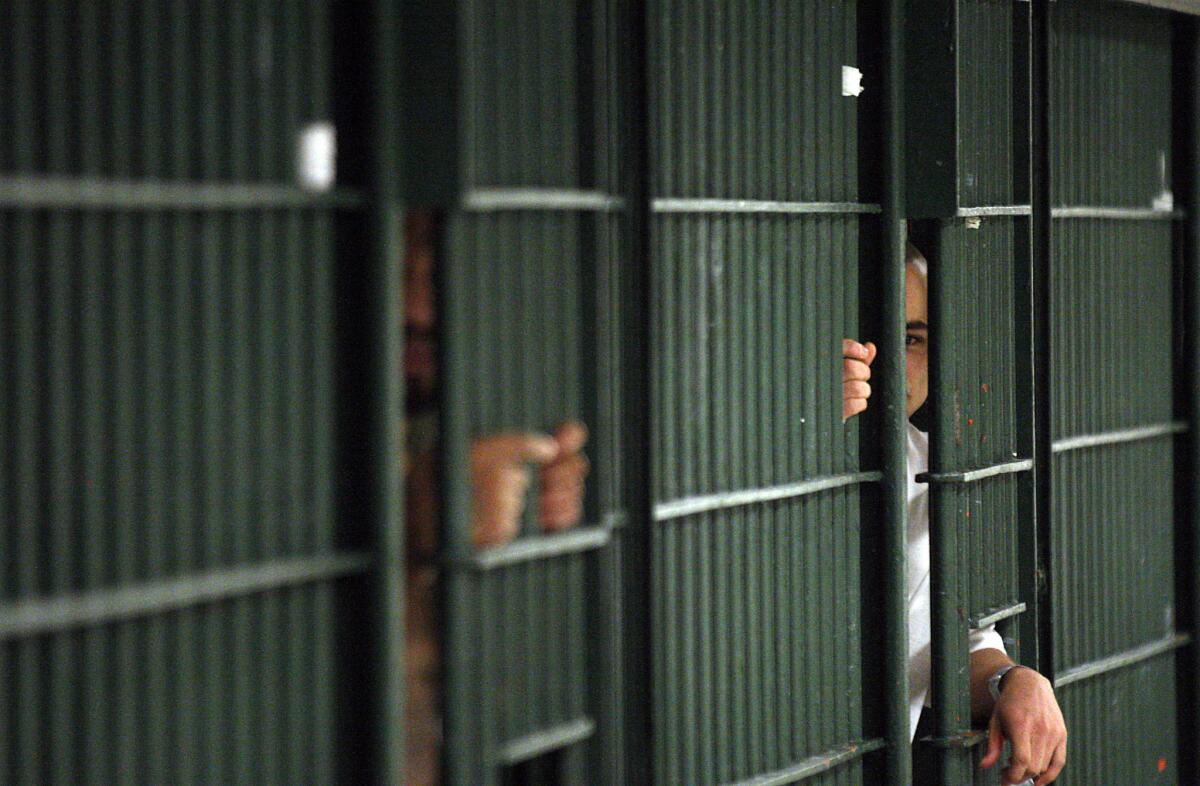Deputy testified bosses told him to hide FBI informant on jail abuse

- Share via
The baby-faced deputy told a federal grand jury that his hiding of an inmate in August 2011 amounted to “kidnapping,” “smoke and mirrors,” and technically speaking, breaking laws. The adversary he and his fellow deputies were working against — “the boogeyman,” as he put it — was the U.S. government and the FBI.
Federal prosecutors on Friday rested their case against Los Angeles Sheriff’s Deputy James Sexton by letting jurors hear in Sexton’s own words the steps he and his colleagues took to hide inmate Anthony Brown, an FBI informant. Sexton is the first of seven sheriff’s officials to be tried on charges of conspiracy and obstruction of justice on accusations that they tried to impede a federal investigation into brutality at the county jails.
In Sexton’s November 2012 grand jury testimony, more than a year before he was indicted, the deputy said he was acting on orders passed down — both expressly and tacitly — from upper echelons of the department.
“To have unlimited overtime for 15, 20 deputies for a prolonged period of time — that took some heavy brass, chief or above,” he said.
That Sexton, who was 26 at the time and three years out of the academy, was simply following orders from above has been the central argument of his defense team.
After sheriff’s investigators realized that Brown had been in contact with the FBI’s civil rights division, Sexton said, his lieutenant asked him to help handle Brown because the deputy was well-versed in the jail’s booking operations.
Initially, Sexton said, he and others moved Brown into “dark corners” of the jail — cells with very limited access. Then the jail began getting calls from outside agencies about Brown — the U.S. Marshals Service trying to serve a federal grand jury subpoena, and the state prison system because Brown had already been sentenced — and their operation kicked into high gear, Sexton said.
He said supervisors made their intentions clear: “Break out the smoke and mirrors. Let’s hide him.”
Sexton and his colleagues listed Brown as having been released from Men’s Central Jail, and rebooked him under a string of fake names, phony crimes and bogus physical descriptions. They took him out to the lockup at the sheriff’s station in San Dimas to be farther from the FBI building in Westwood, Sexton recalled.
The deputies came up with a schedule to stand guard outside Brown’s cell and “baby-sit” him. At one point, Brown, while being questioned by sheriff’s officials for information about a smuggled phone and the federal investigation, was eating pizza, fried chicken and McDonald’s at the San Dimas sheriff’s station, taking smoking breaks in the parking lot, Sexton said.
The deputy told the grand jury that he took the steps with the understanding that not all of it was legal.
“So you understood that that would be breaking some law … is that correct?” a prosecutor asked.
“That’s correct, sir,” Sexton responded.
A member of the grand jury asked Sexton whether they had violated any of Brown’s rights.
“I don’t know about rights. I use the word kidnapping,” he responded. “We had him in places that we did not have the legal authority, in my opinion, to have him.”
In the meantime, upper management at the FBI, the U.S. attorney’s office and the Sheriff’s Department were exchanging a flurry of calls and letters and holding a series of tense meetings. Steven Martinez, who was head of the FBI’s L.A. field office at the time, testified on Friday about calling Sheriff Lee Baca to inform him of the phone his agents had smuggled into the jails to document deputy violence without the sheriff’s knowledge.
Baca was angry, and relations soured between the agencies for a period of time, Martinez recalled.
Martinez said that although he expressed concern for Brown’s safety, he did not request that Baca place him in protective custody.
Sexton’s attorney Thomas O’Brien also called former Undersheriff Paul Tanaka on Friday as one of the defense’s first witnesses. Tanaka, who was Baca’s top aide at the time, testified that he saw nothing “inappropriate” about moving Brown around in the jails under fake names, moving him to lockups in other stations and keeping him from talking to the FBI.
“I had no objection to that plan,” he said.
Tanaka, who himself began his career guarding inmates at Men’s Central Jail, said he found out about Brown when an agitated Baca called about a cellphone confiscated in the jails, after Baca’s phone conversation with Martinez. Baca called an emergency Saturday-morning meeting, and said he wanted the inmate “secured and interviewed,” Tanaka recalled.
Tanaka said the department was concerned for Brown’s safety because he would be in danger if word got out that he was informing on deputies prone to physically abusing inmates. He said he did not remember ordering deputies to take specific measures to hide Brown, but said he was aware of their actions and did not oppose the steps they were taking.
“We have to employ whatever means are available to make sure they’re safe,” he said.
“Mr. Tanaka, you have not been indicted in this matter, have you?” O’Brien asked.
“No,” he said.
More to Read
Sign up for Essential California
The most important California stories and recommendations in your inbox every morning.
You may occasionally receive promotional content from the Los Angeles Times.










